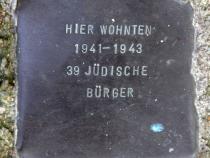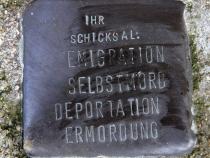Alexander Bukofzer was born on 21 January 1885 in Bromberg (now Bydgoszcz in Poland), a city on the lower Vistula River between Toruń and Piła. The capital of the administrative district of the same name and an important trade hub, Bromberg experienced an economic boom in the 19th century. Alexander’s parents were Hermann Bukofzer, a master butcher, and Hulda Bukofzer, née Pinkus. At the time of Alexander’s birth, the family lived in an apartment at Kujawierstraße 11 (now ul. Kujawska), in the city centre. Hermann Bukofzer ran a butcher’s shop at the same address to support his family. No records have survived of Alexander Bukofzer’s home life, childhood, and youth in imperial Bromberg. Neither is it known whether he had any siblings. But it is most likely that his parents belonged to Bromberg’s Jewish Community, which counted around 1,800 of the city’s approximately 37,000 inhabitants around 1885.
Alexander Bukofzer attended the secondary modern school in Bromberg and trained to become a butcher after completing his schooling. In 1908/1909 he opened a wholesale butcher’s firm, which he initially ran under his father’s business address. From 1914 on he was listed in the local directory as a master butcher under the home and business address Promenadenstraße 7 in nearby Schröttersdorf (Skrzetusko). Three years previously, on 13 November 1911, he had married Cäcilie Hirsch from Rosenfelde (Rozewo). Their son Heinz was born in 1912 or 1913. In 1920 the city of Alexander Bukofzer’s birth became Polish under the Versailles Treaty and, in January that year, his wife Cäcilie died in Bromberg. Alexander Bukofzer then moved with his son Heinz to Berlin, where he ran a wholesale butcher’s stall in the central slaughterhouse and livestock market. On 12 November 1922 he married Ella Groß from Berlin and in 1924 their son Herbert Max was born. At the time of Herbert’s birth, the family lived in an apartment at Klopstockstraße 20 in the Hansaviertel district of Berlin. In 1927 Alexander’s son by his first wife, Heinz, died aged 14 in Moabit hospital. Unfortunately, no further sources exist to tell of the family’s life in Berlin during the Weimar Republic.
The mechanisms gradually introduced from 1933 on to persecute Jews – or all those considered to be Jews under the Nazi state’s Nuremberg Laws – soon hit Alexander Bukofzer and his family. They included numerous measures designed to discriminate against and exclude Jews from society, to deprive them of their civil rights and oust them from the nation’s business and economic life. As a business owner, Alexander Bukofzer was directly impacted by the anti-Semitic campaigns, boycotts, and riots after 1933 that came to a visible head in the progroms of June and November 1938. His wife Ella later described their situation under the increasing persecution as follows: “In the years 1933 and 1934 business was still going quite well. But by 1935 and 1936 it was already much worse as livestock was only allocated to Jews on paper. When my late husband, Alexander Bukofzer, went to see the commissionaire he was told ‘We can’t give you any livestock, strict orders from above.’ Consequently, my husband bought stock at extortionate prices just to be able to serve his customers. He lost a lot of money that way. But he was determined to keep the business going and always hoped that things would change for the better again. But it got worse and worse. In 1937 and 1938 the business was running at a loss. In 1938 it was closed.” In April 1937 the family was forced to give up the apartment on Klopstockstraße that had been their home for many years and took a new apartment at Solinger Straße 10. In November 1938, Alexander Bukofzer was arrested in Berlin, aged 53, and interned and brutally abused in Sachsenhausen concentration camp from 11 November 1938 to 7 December 1938. It is likely that he was only released on condition that he leave the country as soon as possible and forfeit all his assets. His wife later stated that they were forced to sell off their furniture to emigrate and raise the money to pay the required “Jewish property tax” and “emigration tax” as well as the cost of the journey and all the travel documents. Alexander Bukofzer managed to obtain visas for himself, his wife, and his son. They left Germany for South America on 26 March 1939, virtually penniless but safe from deportation and murder. They survived the Nazi regime in exile in São Paulo, Brazil.




